
Alien & Sedition Acts Simulation: Modern Parallels
Protecting the Nation—or Silencing the Opposition?
Introduction
It is a presidential election year, and America is deeply divided.
Misinformation floods social media, immigrants are arriving at record levels, and each political party believes the other threatens the nation’s future.
Your task is to step into the shoes of a modern president, presidential candidate, or policy advisor facing the same fears that once surrounded President John Adams and Thomas Jefferson in 1798.
Back then, the U.S. passed the Alien and Sedition Acts—laws that restricted immigration, targeted political critics, and sparked one of the fiercest debates over liberty in American history.
In this simulation, you must decide how far you’ll go to protect the nation… and how much freedom you’re willing to sacrifice to do it.
Scenario 1: Immigration and National Security
Background (1798):
Federalists feared that French and Irish immigrants were supporting Jefferson’s opposition party. They passed laws to lengthen the citizenship process and gave the president power to deport “dangerous” foreigners.
Modern Parallel:
The southern U.S. border faces record crossings from migrants seeking asylum. Some argue they bring crime and strain public resources; others say they are families escaping violence.
Millions of new Latino voters could swing the election, and both parties are fighting to shape immigration policy.
Your Dilemma:
Will you tighten border security and deportations to maintain control?
Will you delay or restrict paths to citizenship for political gain?
Will you label critics as “soft on crime” or “un-American”?
Decision:
What specific actions will you take to “protect” the nation—and how might your opponents or the public respond?
Scenario 2: Free Speech and Political Opposition
Background (1798):
The Sedition Act made it illegal to publish criticism of the government. Newspaper editors and Jeffersonian opponents were fined or jailed.
Modern Parallel:
Social media spreads both truth and misinformation instantly.
Candidates are defamed online; false stories can shift elections overnight. You have the power to pressure tech companies to remove “dangerous” content—or to criminalize false political speech.
Your Dilemma:
Do you limit online speech that damages your campaign or destabilizes the public?
Do you ban or censor accounts that spread “false” information?
Or do you defend absolute free speech, even when it hurts you politically?
Decision:
Describe how you would handle political opposition in a digital age. What are the risks and rewards of your decision?
Scenario 3: Loyalty and Government Power
Background (1798):
Adams’s supporters believed Jefferson’s followers were traitors sympathetic to France. Loyalty to party became loyalty to country.
Modern Parallel:
Today, accusations of “deep state” sabotage, partisan investigations, and government disloyalty dominate the news.
Leaders demand loyalty from officials and accuse opponents of treason or corruption.
Your Dilemma:
Do you remove disloyal officials or punish critics inside government?
Do you use investigations to weaken your rivals?
Or do you tolerate dissent—even when it challenges your authority?
Decision:
Explain your approach to political opposition within government. How do you balance loyalty and liberty?
Reflection: Comparing 1798 and Modern Issues
After making your decisions, write a short reflection (1 page) addressing the following:
What decisions did you make for each scenario? What motivated your decisions? Were they driven by fear, security, or political advantage?
How did your policies resemble or differ from the Alien and Sedition Acts?
What does this reveal about how easily free speech and immigrant rights can be limited in times of crisis?
In your opinion, did you act more like John Adams or Thomas Jefferson—and why?
Important Note on AI and Originality
You may use AI tools to research background information or clarify historical context, but your report must be written in your own authentic voice.
If AI is used as a reference, you must cite it (e.g., “ChatGPT, 2025”).
Understanding your character and the historical parallels is essential for full credit.
